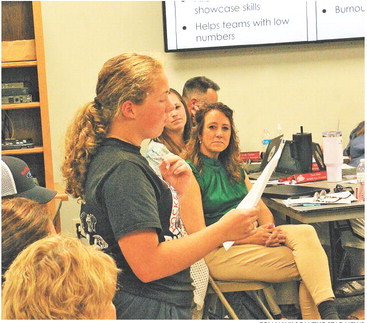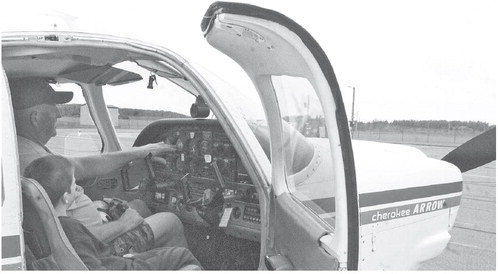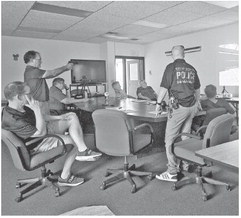Marathon to vote next week on $5.M bonding


Marathon City trustees voted last week to move ahead with buying a slightly used street sweeper in the range of $370,000, which will allow the village to replace its 26-year-old machine with a newer demo model.
The decision came at the end of a nearly 90-minute discussion about a proposal to issue roughly $5.3 million in general obligation bonds in order to refinance several old debts while also freeing up cash for street projects, the new ballpark facility and other expenses.
At the board’s regular monthly meeting on June 4, trustees visited the village garage to look at the 1999 sweeper and the village’s 1996 plow truck, both of which are in need of replacement. They were told that the sweeper costs thousands of dollars per year in repairs and also demands extra time from village employees to fix the sweeping mechanism.
A special meeting was held last Thursday, June 19, to continue the discussion about a proposed promissory note that would be issued in conjunction with a new three-year capital improvement plan that includes the sweeper purchase and a variety of project costs. The bond would also refinance five existing debts totaling about $4 million.
When it comes to the sweeper, board members initially considered the option of buying a 10-year-old used machine for an estimated $120,000 and an estimated five years left on its useful lifespan. Another used option would be to buy a six-year-old sweeper for $175,000, with nine years of estimated life span left.
Village administrator Steve Cherek said his preference was to buy a new demo sweeper for an original estimate of $368,000, which would come with a two-year warranty on parts and last an estimated 15 years. No warranties would be offered on either of the used options.
At last week’s meeting, Cherek said the original demo sweeper that the village was looking at is no longer available, but he’s confident that the village can find a similar sweeper in the same price range. Trustee Keith Paul agreed with Cherek’s recommendation and made a motion to pursue the demo option; the motion passed unanimously.
The sweeper is just one piece of a much larger financing plan. At the board’s next regular monthly meeting on July 2, trustees are tentatively scheduled to vote on the $5.3 million bond issue and the two-year CIP. If that is approved, the village’s bond advisor, Ehlers, plans to issue the bonds in August.
Peter Meidal, a financial consultant from Ehlers, attended last week’s meeting in person so he could answer questions from trustees about the implications of issuing new general obligation debt. He said refinancing the existing debt should accomplish several goals, such as maintaining the village’s annual debt levy at about $316,000 and freeing up about $120,000 per year for street maintenance.
Another objective is to avoid an impending balloon payment on a debt issued last year to cover the costs of adding a new sidewalk on Fourth Street, fixing Hemlock Street and finishing the ballpark project.
The payback period would be extended to 20 years, which made some trustees nervous, but Meidal said it’s often seen as best practice to match the term of a loan with the useful life of the asset. That way, both current and future taxpayers are paying their fair share.
“If you pay in cash upfront, you have some free riders who aren’t paying for it in the future years,” he said. “If you spread it out over the useful life of the project, it’s a little more equitable.”
Trustee Jeff Lawrence wondered what would happen if the board decided not to issue as much debt and focused on paying off what it already owes over the next decade. “With responsible budgeting, we could get out of debt, but it would be 10 years of hell,” he said. “We wouldn’t have any flexibility to buy the things we need.”
When it comes to borrowing for the street sweeper, Lawrence said the village will basically be trading the expense of propping up an older machine for new debt payments.
“You’re either going to pay interest or you’re going to pay maintenance,” Lawrence said. “You’re going to pay for downtime. If you buy new, you really shouldn’t have downtime.”
Trustee Mark Ahrens raised concerns about the village having to pay as much as $291,000 in one year just for interest, but he understood the need for borrowing.
“We can’t live without debt. You’re not going to be able to buy a sweeper with cash,” he said. “We just put ourselves in a bad situation here – having to extend debt out 20 years?”
Cherek said his long-term goal is to make the village less reliant on debt for maintaining its streets and other infrastructure.
“I’m trying to get us out of that borrowing path,” he said.
The village has been able to complete several larger street projects in recent years, Cherek said, but it also needs to invest in new equipment. In the meantime, he said grant money may help expedite projects like the one planned for Market Street.
“So, we’re not neglecting our streets,” he said. “We’re trying to get grant money in between that may move up the project within our affordability range.”
Relining recommended
Another major project that would be paid for with the $5.3 million promissory is the relining of the village’s clay sewer pipes, extending their lifespans by as much as 50 years.
Last week Wednesday, Marathon’s utility commission voted to recommend proceeding with relining all of the village’s older pipes using a process called cured-in-place piping (CIPP).
Cherek said the village has the option of splitting the project into two phases, but that would actually cost about $30,000 more because the cost per lineal foot would increase and mobilization fees would have to be paid twice. The total cost for relining all of the older pipes is estimated to be about $678,000, which would be paid back over a 20-year period.
To cover the debt payments, Cherek said sewer rates will have to be increased by an estimated 7.5 percent, which would be phased in over three years.
The city of Wausau has seen very good results with the CIPP process, he said, noting that private landowners would also have the opportunity to reline their laterals to extend their lifespan.
Cherek showed commissioners a video of the CIPP process, which includes televising, cleaning and removing roots before injecting tubes of quick-drying resin into the old clay pipes.
“It’s quite a unique process,” he said. “You literally have a PVC pipe in the ground when you’re done.”




